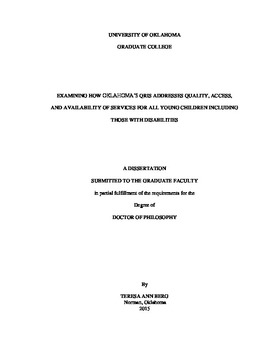| dc.description.abstract | Nearly twenty years ago Oklahoma set the foundation for high-quality childcare in the state and across the country by creating the Reaching for the Stars program (STARs), a Quality Rating and Improvement System (QRIS) (Norris, Dunn, & Eckert, 2003; Oklahoma Department of Human Services, 2014). QRIS is a multi-tiered rating system designed to measure global quality of childcare programs. The program was established through state policy initiatives to enhance the quality of childcare and is based on a collection of empirical findings and past theory. QRIS program standards are designed to improve child outcomes, increase professional development, and parental awareness of early care practices (Child Trends, 2010; Elicker et al., 2013; Karoly, Zellman, & Perlman, 2013;; Korjenevitch & Dunfion, 2010; Norris et al., 2003; Oklahoma Department of Human Services, 2014; Tout, 2013; U.S. Department of Education, 2011; Winton, McCollum, & Catlett, 2008).
Using Bronfenbrenner’s Bioecological Systems Theory as a framework, Bronfenbrenner and Morris (2006) analyzed the quality, access, and availability of childcare services to young children with mild and severe disabilities (Bronfenbrenner & Morris, 2006). The literature base for the study outlines mediating conditions that affect quality childcare and includes a historical review of federal and state mandates, early intervention and inclusion practices, and an in-depth description of Oklahoma’s QRIS program, as well as inadequacies in the macrosystem of childcare services. The literature review also identifies significant gaps within the available literature for young children with disabilities who received childcare services. Focus was placed on inclusion of young children with disabilities through QRIS programs. Using a mixed-methods research approach this study examines how Oklahoma’s QRIS program supports high quality childcare services for young children with mild and severe disabilities. The examination included an analysis of the number of children with mild and severe disabilities served at each level of Oklahoma’s QRIS program. The study also examined how state monetary incentives support services for children with special needs and perspectives from childcare directors’ about why or why not they provide services for children with mild and severe disabilities. | en_US |
